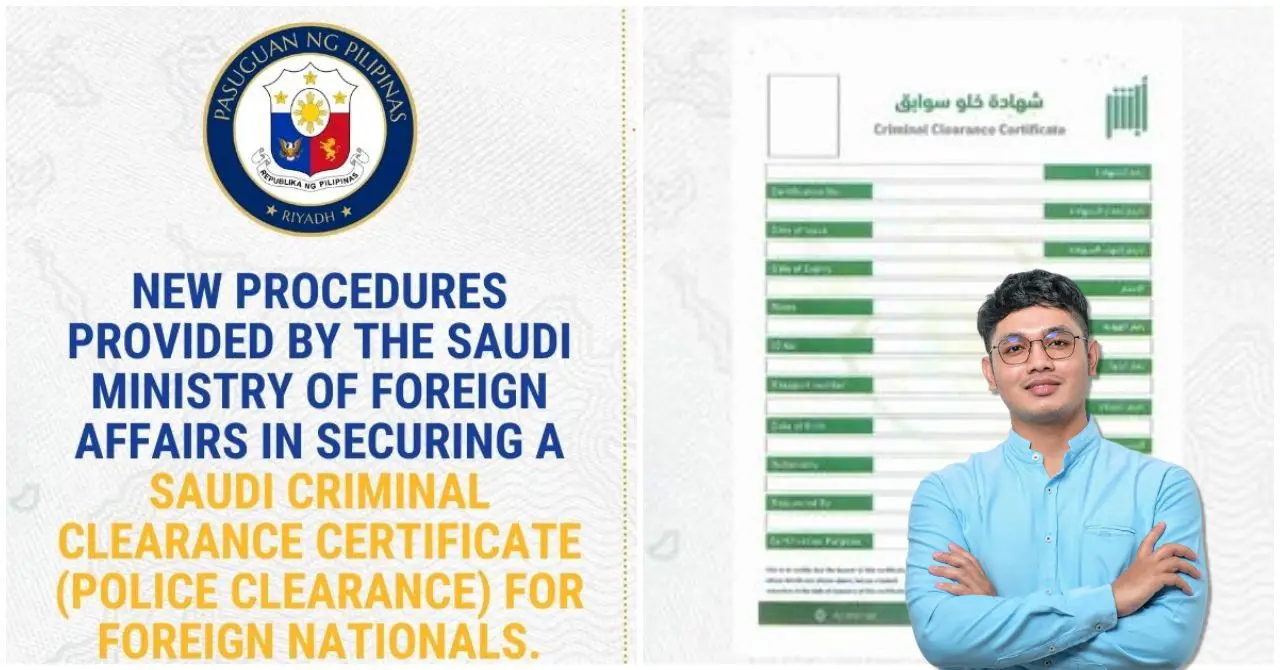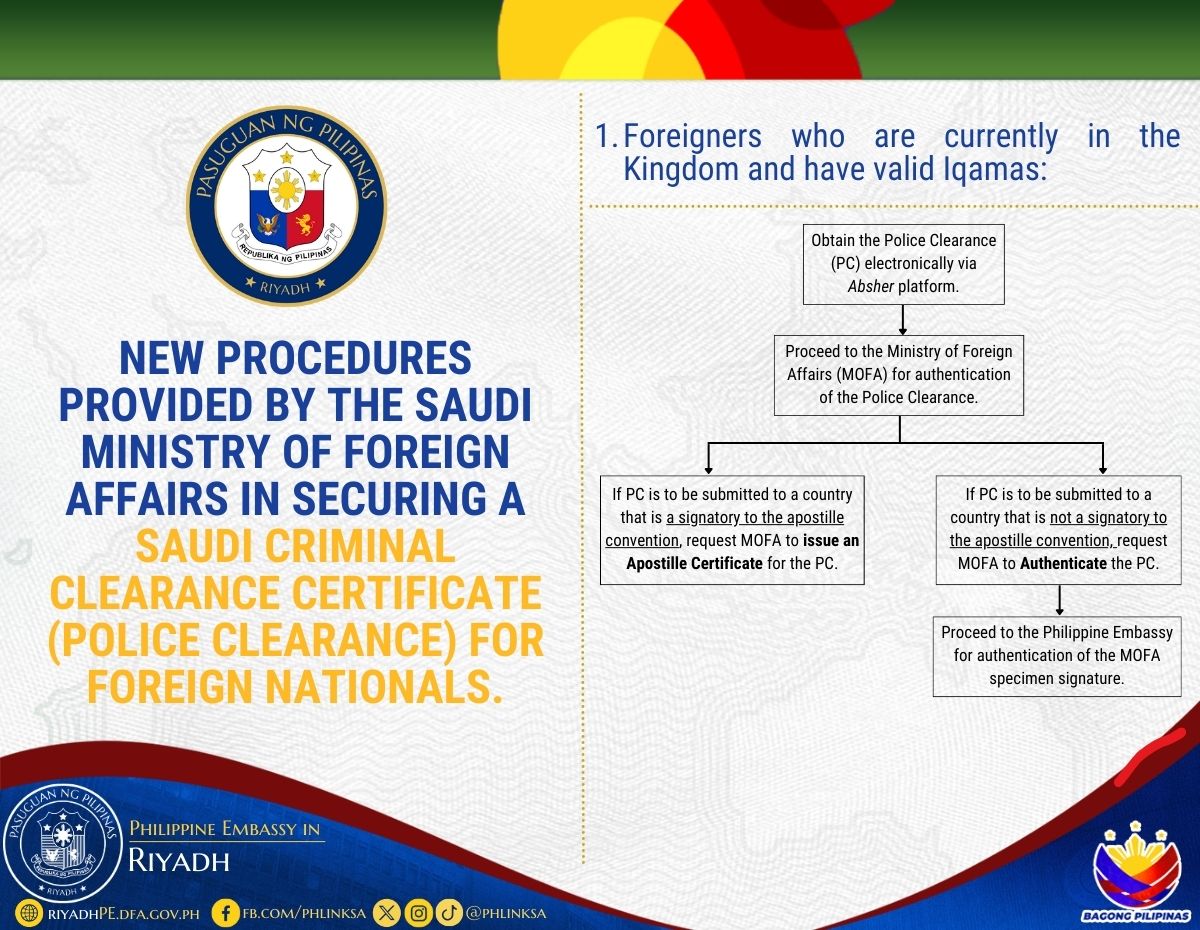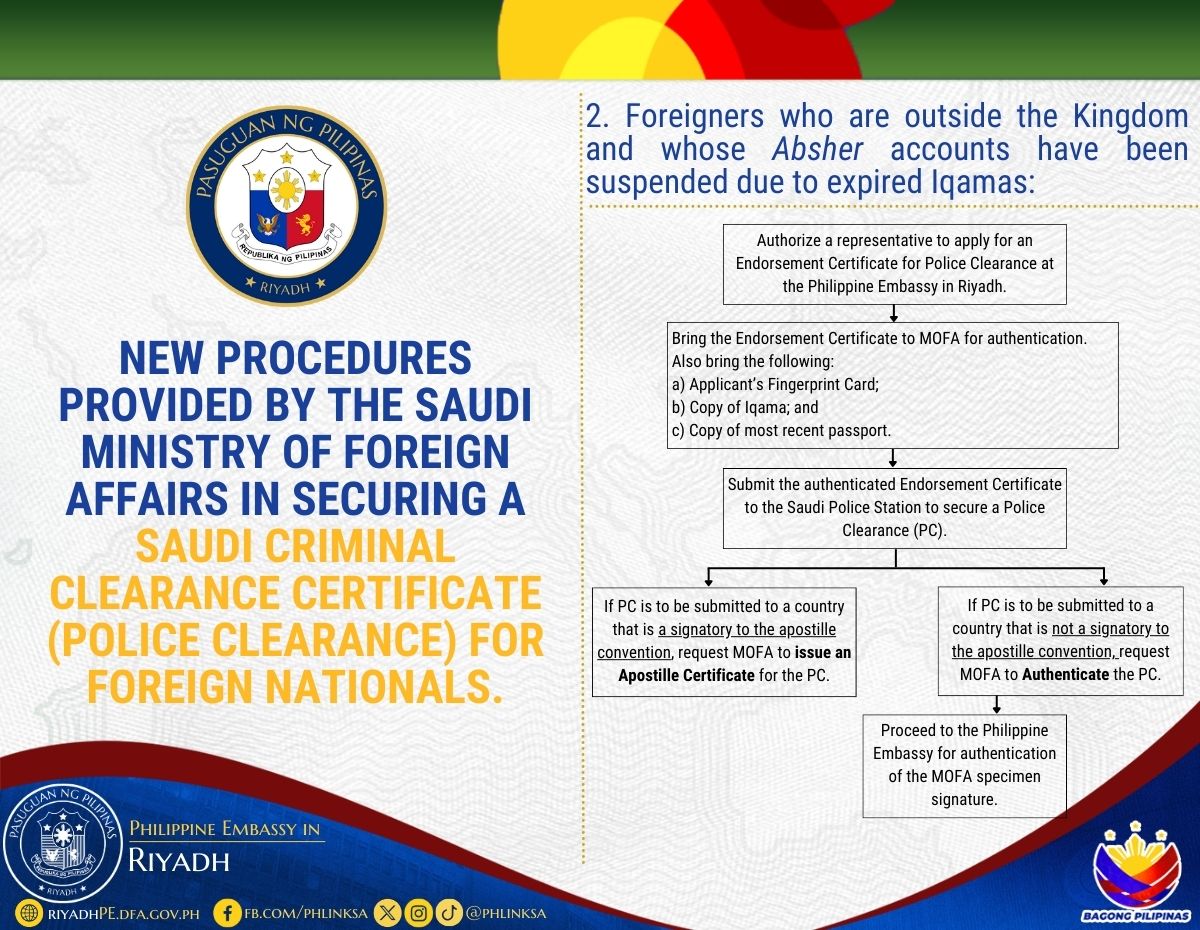A Police Clearance Certificate (PCC) is an essential document issued by the government or police authorities, indicating whether an individual has a criminal record.
This document is essential for foreign nationals in Saudi Arabia, serving those who plan to work, reside, or extend their visas within the Kingdom, as well as those applying for immigration status to other countries.
Eligibility and application procedures vary based on whether the applicant is residing within KSA with a valid Iqama or is outside the Kingdom with an expired Iqama.
Applicants can expect to navigate a process that involves obtaining clearance electronically through the Absher platform, authentication by the Ministry of Foreign Affairs (MOFA), and further steps that differ depending on whether the destination country is part of the Apostille Convention.
Contents

What is a Police Clearance Certificate (PCC)?
A Police Clearance Certificate is an essential document issued by the government or police authorities, indicating whether an individual has a criminal record.
This document is essential for foreign nationals in the Kingdom who plan to work, reside, or extend their visa in the Kingdom.
It’s also necessary when applying for immigration status to other countries.
Eligibility
Eligibility for applying for a PCC in Saudi Arabia varies depending on the individual’s current status and location.
Here’s a detailed breakdown of who can apply for a PCC:
1. Foreign Nationals within Saudi with Valid Iqamas
Foreign nationals who are currently residing in the Kingdom and hold valid Iqamas (residence permits) are eligible to apply for a PCC.
The process can be initiated electronically via the Absher platform, which requires the applicant to have an active account registered under their Iqama.
2. Foreign Nationals outside Saudi Arabia with Expired Iqamas
Foreign nationals who were previously residents in KSA but have since left the country, and whose Iqamas have subsequently expired, can also apply for a PCC.
However, their process is slightly more complex as their Absher accounts are likely suspended.
They need to authorize a representative within the Kingdom to apply for an Endorsement Certificate on their behalf at the Philippine Embassy in Riyadh.
Required Documents
To streamline your application process, ensure you have the following documents ready:
- A copy of your valid Iqama.
- A recent passport copy.
- A colored photo against a white background.
- A duly filled application form provided by your embassy.
Procedure for Foreign Nationals Inside Saudi Arabia with Valid Iqamas
Foreign nationals residing in Saudi with valid Iqamas can obtain their Police Clearance Certificate through the following steps:
- Application via Absher: First, the clearance must be applied for electronically through the Absher platform.
- This is accessible only to those who have an active account.
- Authentication by MOFA: After receiving the clearance, proceed to the Ministry of Foreign Affairs (MOFA) in KSA for authentication.
- Further Steps Based on Destination Country:
- Apostille Countries: If the certificate is to be used in a country that is a signatory to the Apostille Convention, request MOFA to issue an Apostille Certificate.
- Non-Apostille Countries: If the destination country is not a part of the Apostille Convention, request MOFA to authenticate the PCC.
- Embassy Authentication: The final step involves getting the MOFA specimen signature authenticated by your country’s embassy in the Kingdom.

Procedure for Foreign Nationals Outside Saudi Arabia with Expired Iqamas
For foreign nationals outside KSA whose Iqamas have expired, and who have suspended Absher accounts, the process involves more steps:
- Endorsement Certificate Application: Authorize a representative to apply for an Endorsement Certificate at your country’s embassy in Riyadh.
- Authentication of Endorsement Certificate: Bring the Endorsement Certificate to MOFA along with the applicant’s fingerprint card, a copy of the expired Iqama, and a copy of the most recent passport for authentication.
- Obtaining the PCC: Submit the authenticated Endorsement Certificate to the Saudi Police to secure the Police Clearance.
- Authentication Steps: Similar to those inside the Kingdom, based on whether the country is a part of the Apostille Convention or not, further authentication by MOFA is required followed by embassy authentication.

Why the Difference for Apostille vs Non-Apostille Countries?
The variation in the authentication process for Police Clearance Certificates (PCC) between Apostille and Non-Apostille countries stems from the international legal framework established by the Apostille Convention.
The Apostille Convention simplifies the authentication of documents to be used in countries that are members of the convention.
This is achieved by issuing an Apostille Certificate, which is an internationally recognized form of authentication that significantly reduces the complexity and number of steps required for a document to be accepted in another member country.
For countries that are signatories to the Apostille Convention, once the Ministry of Foreign Affairs (MOFA) in KSA issues an Apostille Certificate for a PCC, the document is deemed authentic and can be directly used without further diplomatic or consular legalization.
This streamlines the process and makes it faster and less cumbersome for the applicant.
Conversely, for Non-Apostille countries, the PCC must undergo a more traditional route of authentication.
After MOFA’s initial authentication, the document must then be taken to the embassy of the destination country located in KSA for further authentication.
This often involves verifying the signature of MOFA on the document and sometimes additional steps to confirm the document’s validity according to the receiving country’s standards.
This process is typically more time-consuming and involves multiple layers of verification, making it a lengthier procedure compared to the Apostille process.
Fees and Exemptions
The fee for obtaining a PCC varies depending on the embassy through which you are applying.
Always check with your country’s embassy in KSA for the exact fees.
Notably, Indian nationals have an exemption where they no longer need to submit a PCC for Saudi visas, simplifying their travel and visa application process.
Tips for Filipinos Applying for a PCC the First Time
Before You Apply:
- Plan Ahead: If possible, try to get your PCC before leaving the Philippines. This can save you time and hassle once you’re in Saudi.
- Gather Required Documents: Make sure you have all the necessary documents, including your passport, residence permit (iqama), and any required application forms. Check with the Philippine Consulate General in Jeddah or the Saudi Embassy in the Philippines for their most recent list.
During the Application Process:
- Double-Check Everything: Ensure all your documents are complete, valid, and filled out correctly.
- Be Patient and Polite: The application process may take some time. Be courteous and professional with the embassy or consulate staff.
- Keep Copies: Make copies of everything you submit for your records.
Additional Tips:
- Consider Translation Needs: In some cases, your Philippine police clearance may require translation into Arabic. Factor this into your planning if needed.
- Track Your Application: Depending on where you apply (in KSA or the Philippines), inquire about how to follow up on the status of your PCC.
Samples of Criminal Clearance Certificates
Here are examples of a Criminal Clearance Certificate obtained through Absher and one secured directly from Saudi Police.
These samples show the typical format and information included in the certificates.

Disclaimer: Please note that procedures, fees, and requirements may change. Always check with the official website of the Philippine Embassy in Riyadh or the Philippine Consulate General in Jeddah for the most current information.